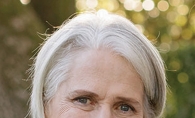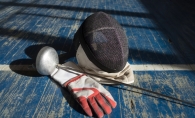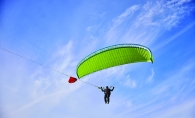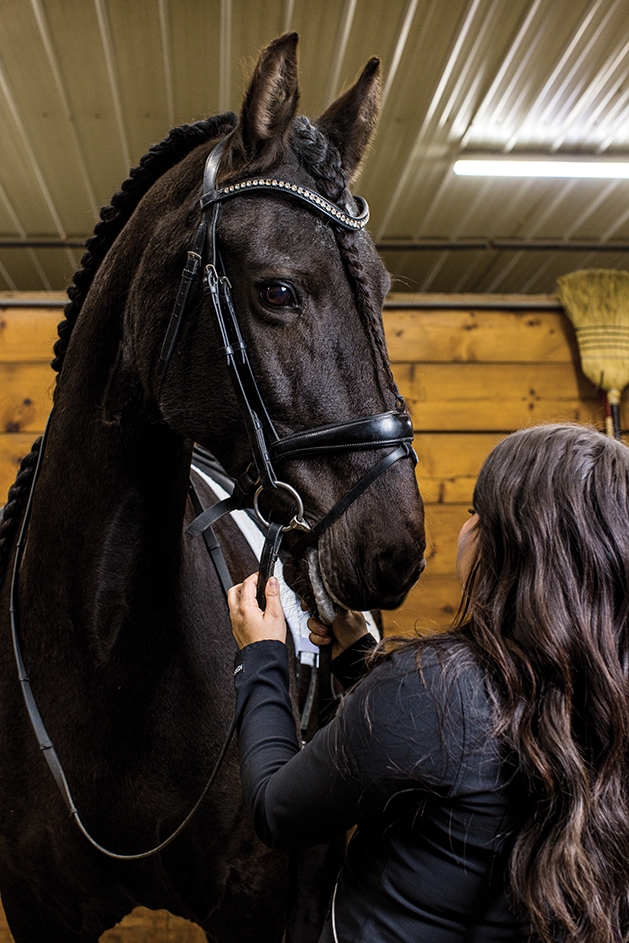
May brings baskets and posies of flowers to our doors. Mothers are honored and treasured with gifts galore. But there’s another tried and true tradition that happens in this glorious month—the greatest two minutes in sports—the Kentucky Derby, held this year on May 7 at Churchill Downs in Louisville, Kentucky.
So that got us thinking about equine themes. While this band of the Metro might be best known for the life aquatic, there are several horse stables throughout the area. Orchard View Stables (OVS) in Watertown is owned by Heather Salden-Kurtz and July Hugen.
The stable boards 35 horses and trains upwards of 60 students through Heather Salden Training. Horse racing is not the name of the game at this stable, but horses are, and that counts in our book. “We specialize mostly in dressage, but we do have a handful of jumpers as well. It’s called combined training or eventing; these riders show both in dressage and jumping,” Salden-Kurtz says.
The sports of horse racing and jumping are self-explanatory, but we’re laying heavy odds that most people don’t know a lot about dressage. Isabelle Gallagher, 22, agrees. “How I explain it is first by saying, ‘Do you know that thing in the Olympics where they are riding the horse but not going over the jumps? Yeah, that’s what I do.’ Or I say, ‘I make the horse dance,’” she says.
“I love dressage because you can never be perfect,” Gallagher says. “I can have the best ride of my life but know there is still something to inspire me to be better at. The ability to constantly learn and connect with your horse is inspiring.”
The Long Lake resident has been riding since she was just 4 years old. “Horses have been there through everything in my life. I was lucky enough to begin riding dressage at a young age, although I was not super-competitive in the sport until I began riding with [Salden-Kurtz].”
Gallagher competes each summer. “My grandma is my show buddy and comes with me to every show,” she says. “She is a positive ray of sunshine at the shows, no matter how my ride goes.” Working toward her competition goals takes work. “Dressage is complex beyond anything I have ever done before. The whole point of the sport is to make it look effortless, which, let me tell you, [it] is not,” she says. Gallagher trains one to three times a week. “The barn is my happy place,” she says. “It grounds me. If I am having a bad week, I know I can go there, and it will bring a smile to my face.”
Ribbons and awards aside, Gallagher points to other rewards that she’s gained from the dressage experience. “Riding has taught me to be a problem solver and be positive. You are working with a partner that does not speak the same language, so when you nail something and understand each other, it’s magical,” she says. “I also have learned so many life lessons from the inspiring women around me at the barn. Each and every one of them is so supportive and helps me grow as a human.”
“One of my favorite things about the sport is you can do it at any age,” Gallagher says. “I am a senior at the University of St. Thomas and have seen multiple of my friends have to say goodbye to their sports from high school or even college because they have finished playing … Sports are such a huge part of us, and you see the sadness on these young adults’ faces as they say goodbye to something that meant so much to them throughout their [lives]. I would be truly heartbroken if I had to say goodbye to riding, but, in this sport, you can be competitive at any age.”
Case in point: Linda Anderson, in her early 70s, is a dressage rider.
“I have always loved horses and rode Western as a young teen—pleasure, barrel racing, pole bending, tandem bareback and a ton of playing around and trail riding,” says the Mound resident. “I first heard of dressage much later in life and started weekly lessons [in] about 1996.
I was hooked on it quickly, and it became my most cherished endeavor.”
Anderson tries to ride four or five times a week. “My favorite thing is just being around the horses and working on an endless list of ways to improve my riding and communicating with my horse,” she says. “The challenges are endless. It keeps me moving … and challenges my mind, trying to improve awareness and focus.” Like Gallagher, Anderson has gleaned life skills through the sport. “I would say confidence is a big benefit of the sport and fitness comes along with it,” she says.
Anderson began competing eight years ago. “I love going to the shows being with the team from OVS, supporting each other and caring for my horse,” she says. “I am not that crazy about being in the ring, and my nerves really get in the way. I have met my goal for showing and now am looking at new goals, perhaps a pas de deux or freestyle as music soothes me.”
On the other end of the age spectrum is Victoria’s Juliana Streeter, 11, who began riding more than two years ago. “I liked the style because it is so pretty and fancy,” she says. Take note: Don’t confuse those descriptors as easy and leisurely. “It’s very exciting but can be hard at times,” she says. “It’s a lot of work.”
Hard work has translated into some personal gains. “It has helped me with confidence,” Juliana says. “I’m shy, and riding each week is something I look forward to … It has taught me to be more assertive and confident because I’m telling the horse what to do and where to go. It’s a huge animal!”
The downside? “You have to be OK with falling off and also be OK with the stinkiness and how large horses are,” she says. Fair enough.
History Lesson
According to the United States Dressage Federation, dressage can be traced back to classical Greek horsemanship. The sport was developed by the military, and, during the Renaissance, European aristocrats showcased their trained horses in equestrian pageants.
“The Imperial Spanish Riding School of Vienna was established in 1572, and dressage training today is based around many of the principles from this era,” it says. Dressage’s Olympic debut was during the 1912 games in Stockholm, Sweden, but only military officers were eligible to compete. This changed in 1953 when civilian men and women to were allowed into competition.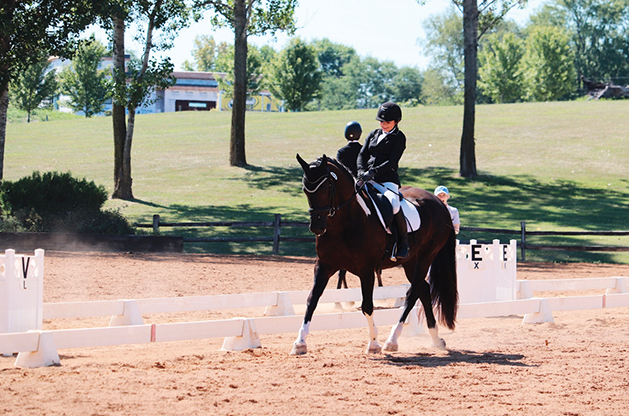 Photo by: Isabelle Gallagher
Photo by: Isabelle Gallagher
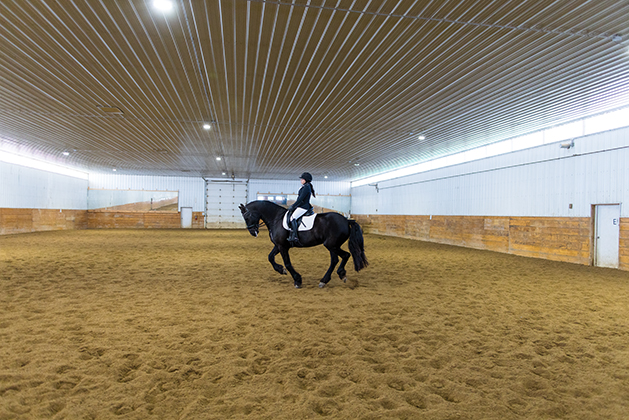 Isabelle Gallagher trains up to three times a week and has gained valuable lessons through dressage experiences.
Isabelle Gallagher trains up to three times a week and has gained valuable lessons through dressage experiences.
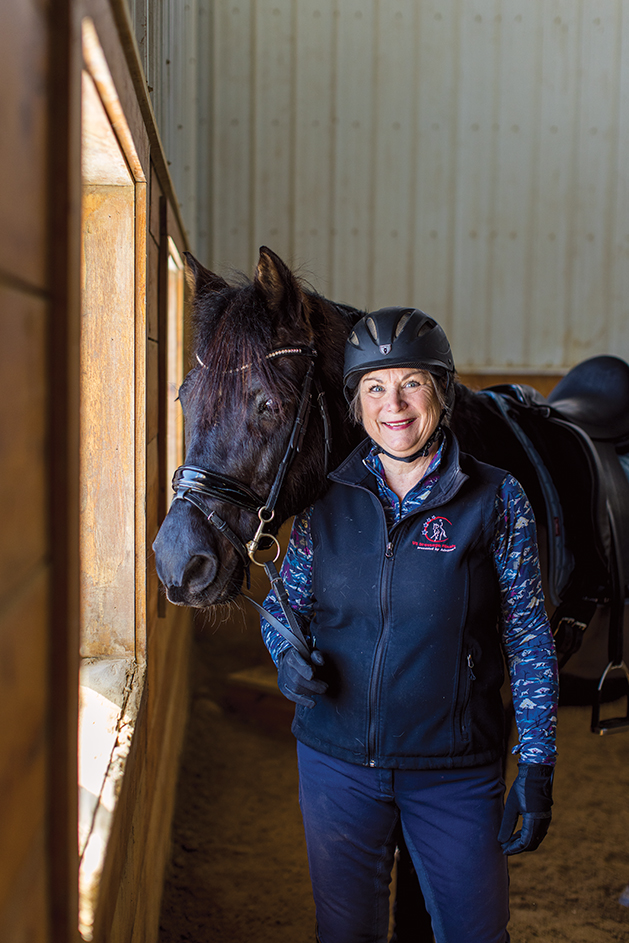 Linda Anderson
Linda Anderson
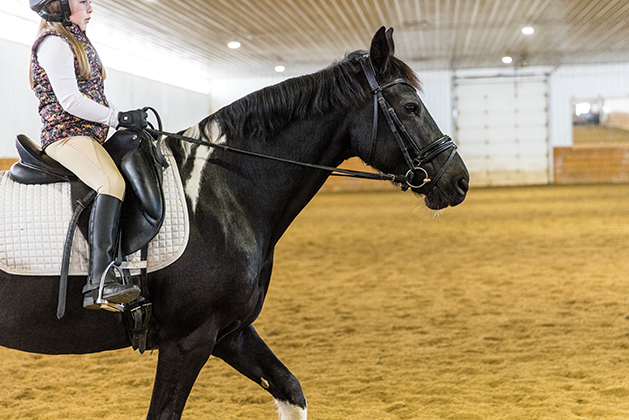
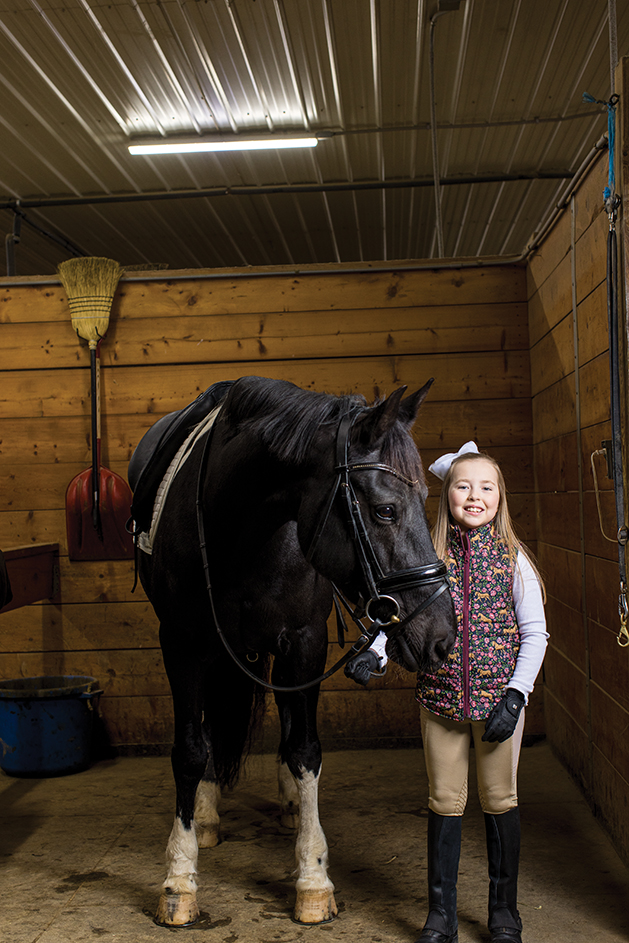 Juliana Streeter
Juliana Streeter
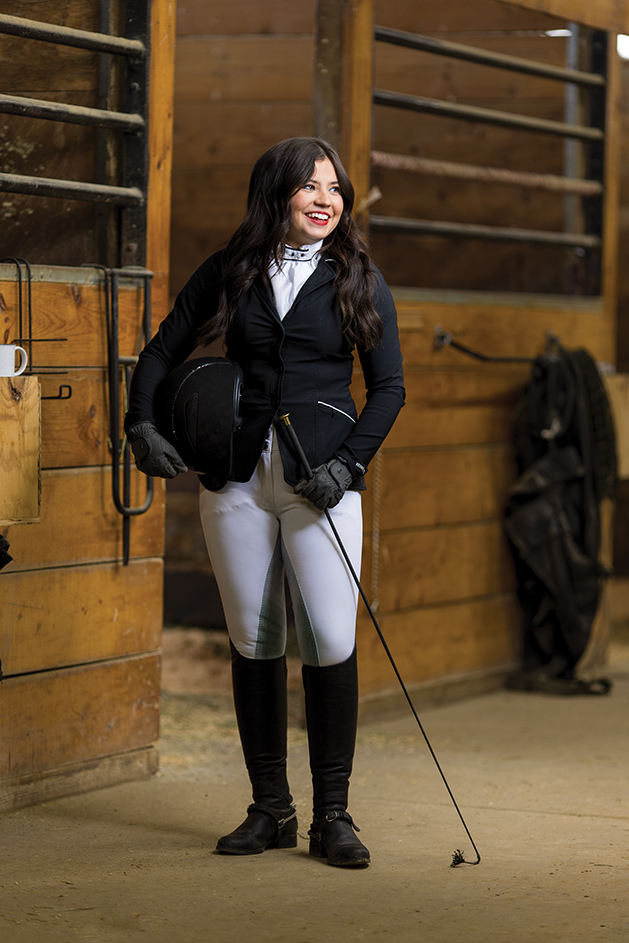 “I love the clothing aspect. If you look fabulous, you can be fabulous. They may beat me in the ring, but they will not beat my outfit. My staple is a red lipstick for when I show. It’s all about confidence, and red lipstick makes me feel fierce.” -Isabelle Gallagher
“I love the clothing aspect. If you look fabulous, you can be fabulous. They may beat me in the ring, but they will not beat my outfit. My staple is a red lipstick for when I show. It’s all about confidence, and red lipstick makes me feel fierce.” -Isabelle Gallagher
Learning about the Teacher
Salden-Kurtz is a United States Dressage Federation (USDF) certified instructor/trainer and a multi-winning USDF medalist (including gold). Her path in the sport began at an early age, and she started riding when she was 13. “I rode my bike two miles to a barn that was being built outside of town,” she says. “I asked for a job, and after a few years of caring for the horses, I began working for the trainer. I learned a ton from handling horses and watching lessons and training sessions, and I eventually began riding the young horses and working with horses that were considered problem horses. Earning a horse’s trust and creating a real partnership is such an honor, and I’ve been hooked ever since.”
Tell us more about the sport.
Dressage is basically about training the horse to use their bodies in a proper way to build strength and longevity. Think about it like yoga. It builds suppleness, flexibility and strength, so the horses stay healthy as they age. If you’ve seen the Olympics, dressage is the “fancy prancing” in the traditional black and white uniforms. Horses can be trained to do some pretty amazing things.
Why focus on dressage as a career?
I love spending time with the horses and learning each of their personalities. They all learn differently, just like children, so when you find a way to communicate with them individually and they have that aha! moment, it’s fun and fulfilling. I enjoy working with horses over the long term to see where training can take them ... I also find teaching my students incredibly gratifying.
What about your riding career?
I got my first horse when I was 14 years old and competed him in jumping and eventing. I also enjoyed trail rides and spending time with him … I’ve had many horses since then, and I typically train them through the levels of dressage or jumping until they reach their potential. Some horses are more talented than others, and I absolutely respect that at some point, they may not be able to excel further.
Do you still compete?
I have an active competition life encompassing both my horses and my students. Our barn attends at least 15 shows every summer, sometimes with up to 15 horses at a show. We have great success, and even more importantly, great fun and camaraderie. Our last show of 2021 was the United States Dressage Finals in beautiful Lexington, Kentucky. It is the national championship show, meaning only the top riders/horses that qualified in each region are invited to participate. I brought two of my horses last year, as well as three students. It is surreal to show at the legendary Kentucky Horse Park. Everything is immaculate and prestigious. It is one of my favorite places. I ended up finishing sixth in the nation on my young horse, as well as National Champion on one of my student’s horses. My students also did well, finishing in the top 10 in the country.
Is it ever too late to begin dressage?
Many of my students didn’t start riding until later in life and have found a wonderful riding “family” at OVS. We are all drawn together by our love for the horses, and this common language creates a magical world for us here at OVS.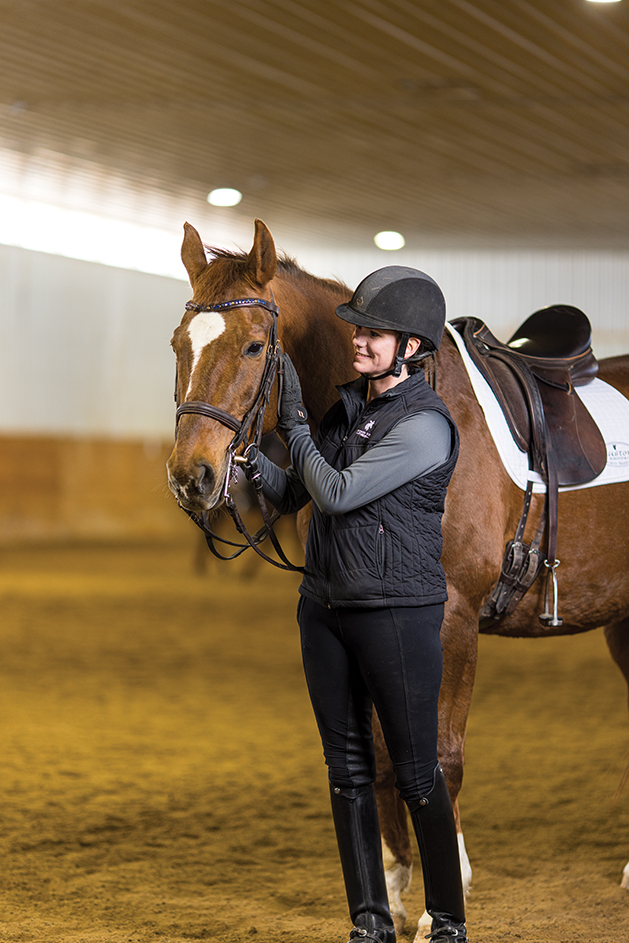
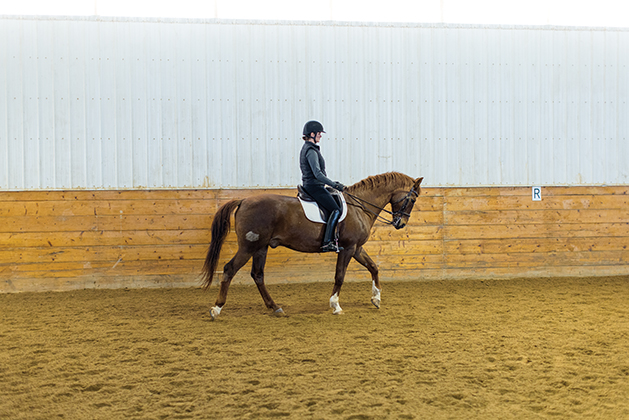
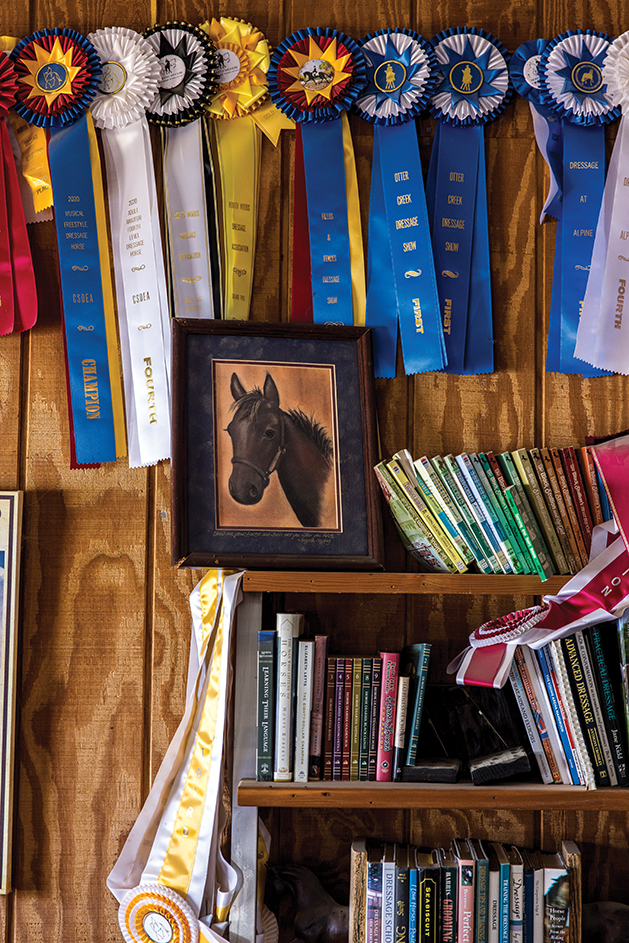
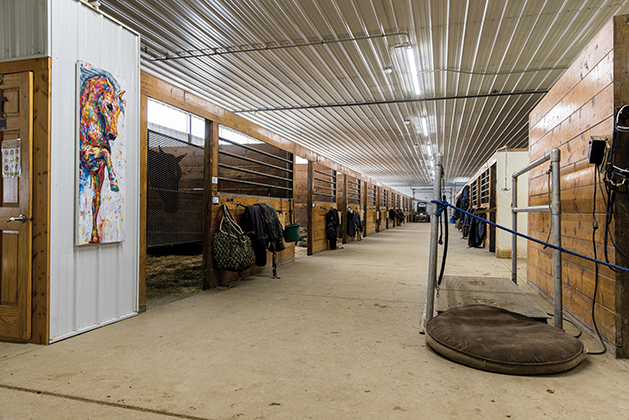 Orchard View Stables, 2830 Rose Ave., Watertown; 612.360.0848; saldentraining.com Orchard View Stables @orchard.view.stables
Orchard View Stables, 2830 Rose Ave., Watertown; 612.360.0848; saldentraining.com Orchard View Stables @orchard.view.stables







